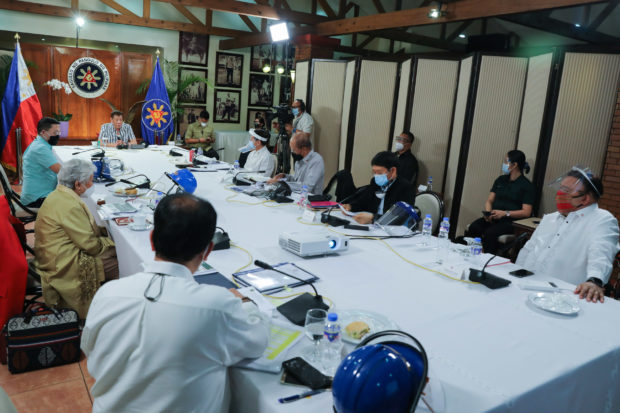Gov’t OKs deployment and vaccination plan to end Covid-19 in PH

(FILE) President Rodrigo Roa Duterte holds a meeting with members of the Inter-Agency Task Force on the Emerging Infectious Diseases (IATF-EID) at the Malago Clubhouse in Malacañang on June 15, 2020. ROBINSON NIÑAL JR./PRESIDENTIAL PHOTO
MANILA, Philippines — The national government has approved and ratified its plan for mass immunization against Covid-19 a year since the pandemic began in the country.
In a memorandum dated Jan. 26 but was released to the media this Saturday, the Inter-Agency Task Force (IATF) for the Management of Emerging Infectious Diseases Resolution No. 95 or the “Philippine National Deployment and Vaccination Plan for Covid-19 Vaccines” was approved.
The memorandum was signed by National Task Force (NTF) against Covid-19 chief implementer Carlito Galvez Jr., as well as Defense Secretary and NTF chairperson Delfin Lorenzana, and Interior Secretary and NTF vice chairman Eduardo Año.
The memorandum ordered all agencies of NTF, its regional local Covid-19 task forces and all regional and local Covid-19 vaccination operations centers, local task forces and local Covid-19 vaccination operation centers to implement and adapt the vaccination plan.
The country’s vaccination plan, which was released by the Department of the Interior and Local Government (DILG), cited that P82.5 billion has been allocated for funding sources of the Covid-19 vaccine deployment program.
Article continues after this advertisementUnder the 118-page vaccine plan, all regional offices and local government units are enjoined to put up vaccination operations centers (VOC) as soon as possible.
“The implementing units such as government hospitals (both private and public), private clinics, government agencies, rural health units) shall forward all concerns and reports to the City/Municipal Health Offices. The City/Municipal Health Offices, in turn, are required to report all concerns and updates to the VOC,” read the vaccine plan.
“All reports and unsettled issues of a VOC shall be raised to the overseeing VOC. The overseeing VOC, on the other hand, shall provide feedback and provide recommendation to the reporting VOC,” it added.
Masterlisting
The vaccine deployment plan also includes masterlisting or the linelisting and registration of the population before the vaccination process.
“This could be done through an online or offline platform developed by the DICT, and DOH’s KMITS and EB. From the masterlist, eligible populations for specific vaccines will be culled out and accessed by appropriate regions or LGU for registration, scheduling, mapping-out on appropriate vaccination sites and advisory,” read the Covid-19 vaccine plan.
The LGUs are required to undergo profiling and screening of eligible target populations for the registration of mass immunization.
The masterlisting are as follows:
- Group A includes frontline health workers, senior citizens, indigent population and uniformed personnel.
- Group B includes other frontline workers and special populations.
- Group C, meanwhile, is the remaining population.
Consent for Covid-19 vaccine recipient
The country’s mass inoculation plan also underscored informed consent for citizens who will get vaccinated. It said informed consent is “ethical and legal requirement.”
Recipients must know the adverse effects as well as potential unknown risks of the Covid-19 vaccines.
“In the current situation, it will be important to make clear to potential recipients of a COVID-19 vaccine that the duration of immunity conferred is currently unknown and may not be equally effective across all age-groups. The benefits and risks that are disclosed will depend on what is known about them at the time consent is given,” read the vaccine deployment plan.
Post evaluation on vaccines
Also included in the vaccine plan are vaccine safety monitoring and management of adverse effects “after the first dose of vaccine was administered.”
“The role of vaccine safety monitoring during COVID-19 vaccine introduction is to facilitate the early detection, reporting, notification, investigation and analysis, and feedback of Adverse Events Following Immunization (AEFIs) and Adverse Events of Special Interest (AESI), to ensure appropriate and timely case management and response,” read the vaccine plan.
“These activities shall assist vaccinees and ensure them of prompt and timely response should an AEFI occur,” it added.
JPV
READ: Rumors and fear dog Philippine plan for coronavirus vaccine drive
For more news about the novel coronavirus click here.
What you need to know about Coronavirus.
For more information on COVID-19, call the DOH Hotline: (02) 86517800 local 1149/1150.
The Inquirer Foundation supports our healthcare frontliners and is still accepting cash donations to be deposited at Banco de Oro (BDO) current account #007960018860 or donate through PayMaya using this link.